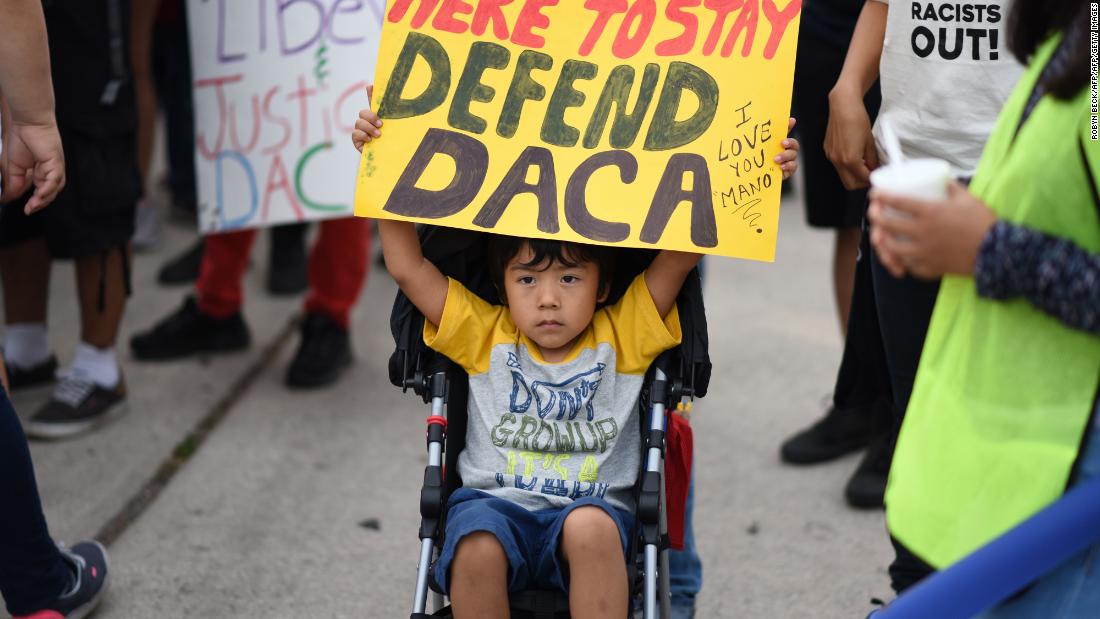[ad_1]
How the Supreme Court will rule is uncertain, but watch for a 4-4 split along the Court’s ideological fault lines. Expect the four conservative justices, all appointed by Republicans (Justices Clarence Thomas, Samuel Alito, Neil Gorsuch and Brett Kavanaugh) to support the Trump administration’s effort to end DACA, and the four liberal justices, all appointed by Democrats (Justices Ruth Bader Ginsberg, Stephen Breyer, Sonia Sotomayor and Elana Kagan) to vote against it.
Now, your questions
Kevin, Germany: As part of Epstein’s nonprosecution agreement in Florida, federal prosecutors agreed not to charge certain co-conspirators. Was the agreement legal, and can it still be enforced after Epstein’s death?
If Epstein’s co-conspirators are eventually charged, they surely will point to the Florida deal and argue: “But the Justice Department already agreed not to prosecute us, in the Epstein deal.” However, I do not think the Epstein agreement ultimately will protect his co-conspirators.
Finally, now that Epstein is dead, arguably there is nobody left who has legal standing to enforce the agreement. Epstein himself might have been able to argue that, as a signatory to the agreement, he had the legal right to enforce it. But the co-conspirators themselves were not parties to the deal, and hence cannot come in as outsiders seeking to enforce (and benefit) from it.
Scott, Texas: Regarding the Southern District’s investigation of Epstein and his associates, what happens if prosecutors find evidence of other unrelated crimes?
It is common for prosecutors to start investigating a subject for one suspected crime but then to find evidence of another unrelated crime. There is no law that prosecutors can charge only those crimes that they originally set out to investigate. To the contrary, it is entirely legal and appropriate for prosecutors to go wherever the evidence takes them — even down unexpected roads.
Prosecutors often discover unexpected crimes because they examine basic information about a subject’s history, including financial records, tax records, phone records and emails — all of which can reveal or suggest wrongdoing. And in longer-term investigations, prosecutors often develop cooperating witnesses, who can guide prosecutors through previously-unknown crimes committed by the subject. I once had a case that began as an investigation of a subject for extortion. After we flipped one of his criminal associates, we learned that the subject also had engineered a string of armed robberies and a murder.
If the Southern District finds evidence on Epstein’s associates unrelated to the sex trafficking ring, it has several options. It can charge the unrelated conduct, assuming there are applicable federal charges and the conduct happened within the Southern District’s geographic venue. If the unrelated conduct violated state (but not federal) laws, then it can refer the case to the appropriate state-level prosecutor. Or, if the unrelated conduct did violate federal law but happened in a different district, the Southern District can refer the case to the appropriate US attorney’s office. Bottom line: anything the Southern District uncovers about its subjects, even if initially unexpected, can and likely will be charged.
Ethan, Ohio: Do “red flag” gun laws violate the basic constitutional right held by American citizens to bear arms?
On balance, however, due process arguments should not prevail because most red flag laws — which aim to protect the public against potentially dangerous individuals owning firearms — already satisfy due process requirements. For example, the person seeking a confiscation order must convince a judge that the subject poses a threat. And the confiscation is only temporary, subject to challenge and renewal at regular intervals.
Three questions to watch:
[ad_2]
Source link



